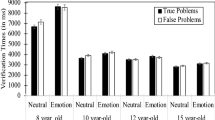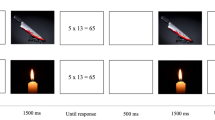Abstract
Using a mental imagery procedure, positive or negative emotions were experimentally induced in 5- and 10-year-old children. In the case of the younger children, the induced emotions influenced their performance on a subsequent memory task, i.e. happy children did better than sad ones. Ten-year-olds, however, seemed to perform at an optimal level in both emotional circumstances. It was argued that these older children, with the help of their firmly established general knowledge about the possible effects of emotion on performance, spontaneously countered the effects of the emotion induction procedure. Activation of the young children’s latent knowledge of these effects, simply by questioning them on this point beforehand, produced, even in their case, an optimal performance in both the happy and sad conditions.
Résumé
Des états émotifs à valence positive ou négative sont expérimentalement provoqués chez des enfants de 5 et 10 ans, à l’aide d’une procédure d’imagerie mentale. Dans l’échantillon des plus jeunes enfants on observe un effet de l’état émotif induit sur la performance à une tâche de mémoire: les enfants «heureux» réussissent mieux que les enfants «tristes». Les enfants de 10 ans sont capables de résultats optimaux quel que soit l’état induit. On suppose que chez ces enfants plus âgés, la connaissance des effets possibles de l’émotion sur la performance a provoqué une compensation spontanée de ces effets dans l’expérience. Une activation des mêmes connaissances latentes chez les enfants de 5 ans, par un simple questionnement préalable sur ce point, provoque une réussite optimale dans les deux conditions.
Similar content being viewed by others
References
Arnold, M. B. (1960) Emotion and Personality, vol. 1. Columbia University Press, New York.
Bower, G. H. (1981) Mood and memory. American Psychologist, 36, 129–148.
Bower, G. H., Monteiro, K. P. & Gilligan, S. G. (1978) Emotional mood as a context of learning and recall. Journal of Verbal Learning and Verbal Behavior, 17, 573–585.
Broadhurst, P. L. (1957) Emotionality and the Yerkes-Dodson Law. Journal of Experimental Psychology, 54, 345–352.
Diener, C. I. & Dweck, C. S. (1978) An analysis of learned helplessness: Continuous changes in performance, strategy and achievement cognitions following failure. Journal of Personality and Social Psychology, 36, 451–462.
Farber, I. E. (1954) Anxiety as a drive state. In Nebraska Symposium on Motivation (Edited by Jones, M. R.), University of Nebraska Press, Lincoln, Nebraska.
Flavell, J. H. (1977) Cognitive Development. Prentice Hall, Englewood Cliffs, New Jersey.
Flavell, J. H. & Wellman, H. (1977) Metamemory. In Perspective on the Development of Memory and Cognition (Edited by Hail, R. V. & Hagen, J. W.), Lawrence Erlbaum Associates, Hillsdale, New Jersey.
Frieze, I. H. & Snyder, H. H. (1980) Children’s beliefs about the causes of success and failure in school settings. Journal of Educational Psychology, 72, 186–196.
Gilligan, S. G. & Bower, G. H. (1984) Cognitive consequences of emotional arousal. In Emotions, Cognitions & Behavior (Edited by Izard, C. E., Kagan, J. & Zajonc, R. B.), Cambridge University Press, Cambridge.
Harris, P. L. & Olthof, T. (1982) The child’s concept of emotions. In Social Cognition: Studies of the Development of Understanding (Edited by Butterworth, G. & Light, P.) Harvester Press, Brighton.
Harris, P. L., Olthof, T. & Meerum Terwogt M. (1981) Children’s knowledge of emotion. Journal of Child Psychology and Psychiatry, 22, 247–261.
Hettena, C. M. & Ballif, B. L. (1981) Effects of mood on learning. Journal of Educational Psychology, 73, 505–508.
Isen, A. M., Shalker, Th. E., Clark, M. & Karp, I. (1978) Affect, accessibility of material in memory, and behavior: a cognitive loop? Journal of Personality and Social Psychology, 36, 1–12.
Izard C. E., Wehmer, G. M., Livsey, W. L. & Jennings, J. R. (1965) Affect; awareness and performance. In Affect, Cognition and Personality (Edited by Tomkins, S. S. & Izard, C. E.), Travistock Publ., London.
Koops, W. (1981) Sociale Ontwikkeling en Naïviteit van Proefpersonen (Social Development and Naive Subjects). Van Loghum Slaterus, Deventer.
Kreutzer, M. A., Leonard, C. & Flavell, J. H. (1975) An interview study of children’s knowledge about memory. Monograph of the Society for Research in Child Development, vn40 (1, serial No. 159).
Lazarus, R. S. (1975) The self-regulation of emotion. In Emotions; Their Parameters and Measurement (Edited by Levi, L.), Raven Press, New York.
Masters, J. C., Barden, R. Ch. & Ford, M. E. (1979) Affective states, expressive behavior and learning in children. Journal of Personality and Social Psychology, 37, 380–390.
Meerum Terwogt, M. (1984) Emotional Development in Middle Childhood: A Cognitive View. Doctoral Dissertation, Free University, Amsterdam.
Meerum Terwogt, M., Schene, J. & Harris, P. L. (1986). Self-control of emotional reactions by young children, Journal of Child Psychology & Psychiatry, in press.
Nisbett, R. E. & Wilson, T. D. (1977) Telling more than we can know: Verbal reports on mental processes. Psychological Review, 84, 231–239.
Mischel, W. (1974) Processes in the delay of gratification. In Advances in Experimental Social Psychology, Vol. 7 (Edited by Berkowitz, L.), Academic Press, New York.
Mischel, W. & Patterson, C. J. (1979) Effective plans for self-control in children. In Minnesota Symposium in Child Psychology (Edited by Collins, A.), Erlbaum, Hillsdale, New Jersey.
Polivy, J. (1981) On the induction of emotion in the laboratory: Discrete moods or multiple affect states? Journal of Personality and Social Psychology, 41, 803–817.
Rozin, P. (1975) The evolution of intelligence and access to the cognitive unconscious. In Progress in Psychobiology and Physiological Psychology, Vol. 6. (Edited by Sprague, J. & Epstein, A. N.), Academic Press, New York.
Singer, J. L. & Singer, D. G. (1976) Imaginative play and pretending in early childhood: some experimental approaches. In Child Personality and Psychopathology: Current Topics (Edited by Davids, A.), John Wiley, New York.
Spence, K. W. (1958) A theory of emotionally based drive (D) and its relation to performance in simple learning situations. American Psychologist, 13, 131–141.
Spence, K. W. (1964) Anxiety (drive) level and performance in eyelid conditioning. Psychological Bulletin, 61, 129–134.
Velten, E. (1968) A laboratory task for induction of mood states. Behavioral Research and Therapy, 6, 473–482.
Weiner, B. (1979) A theory of motivation for some classroom experiences. Journal of Educational Psychology, 71, 3–25.
Weiner, B., Russell, D. & Lerman, L. (1979) The cognition-emotion process in achievement-related contexts, Journal of Personality and Social psychology, 37, 1211–1220.
Yerkes, R. M. & Dodson, J. D. (1908) The relation of strength stimulus to rapidity of habit formation. Journal of Comparative Neurological Psychology, 18, 459–482.
Author information
Authors and Affiliations
Rights and permissions
About this article
Cite this article
Meerum Terwogt, M. Affective states and task performance in naive and prompted children. Eur J Psychol Educ 1, 31–40 (1986). https://doi.org/10.1007/BF03177409
Received:
Revised:
Published:
Issue Date:
DOI: https://doi.org/10.1007/BF03177409




